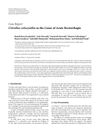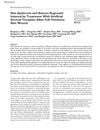 9 citations,
January 2013 in “Case reports in emergency medicine”
9 citations,
January 2013 in “Case reports in emergency medicine” Eating Citrullus colocynthis can cause severe intestinal bleeding and damage.
 1 citations,
January 2020 in “Indo global journal of pharmaceutical sciences”
1 citations,
January 2020 in “Indo global journal of pharmaceutical sciences” Citrullus colocynthis and Citrullus lanatus have potential health benefits but may also cause reproductive toxicity.
 18 citations,
December 2021 in “Foods”
18 citations,
December 2021 in “Foods” Seaweeds contain beneficial compounds with potential uses in food, cosmetics, and health, but more research is needed to improve extraction and safety.
 2 citations,
April 2023 in “Pharmaceuticals”
2 citations,
April 2023 in “Pharmaceuticals” Scopolin and scopoletin from Merremia peltata leaves may help treat hair loss and showed promising results in rabbit tests.
Natural products may help treat hair loss by promoting hair growth with fewer side effects.
9 citations,
June 2022 in “Plants” Shallot extract may help with hair growth and treating hair loss.
 7 citations,
December 2022 in “Plants”
7 citations,
December 2022 in “Plants” Guava leaf extract may help treat hair loss and protect cells by blocking certain genes and fighting damaging molecules.
 7 citations,
January 2022 in “Plants”
7 citations,
January 2022 in “Plants” Rice husk and bran extracts from the Bue Bang 3 CMU variety can potentially treat hair loss due to their antioxidant, anti-inflammatory, and anti-androgenic properties.
 95 citations,
May 2012 in “British Journal of Dermatology”
95 citations,
May 2012 in “British Journal of Dermatology” Androgens block hair growth by disrupting cell signals; targeting GSK-3 may help treat hair loss.
 68 citations,
August 2014 in “Stem Cells Translational Medicine”
68 citations,
August 2014 in “Stem Cells Translational Medicine” Dermal papilla cells help wounds heal better and can potentially grow new hair.
9 citations,
June 2023 in “Cells” Certain natural and synthetic compounds may help treat inflammatory skin diseases by targeting a specific signaling pathway.
 September 2010 in “Advances in Dermatology and Allergology/Postępy Dermatologii i Alergologii”
September 2010 in “Advances in Dermatology and Allergology/Postępy Dermatologii i Alergologii” TrichoScan is reliable for counting and measuring hair density but may not accurately assess hair types in women with hair loss.
 184 citations,
December 2018 in “Nature Communications”
184 citations,
December 2018 in “Nature Communications” Researchers created human hair follicles using a new method that could help treat hair loss.
 45 citations,
January 2020 in “International Journal of Molecular Sciences”
45 citations,
January 2020 in “International Journal of Molecular Sciences” Some natural compounds may help overcome drug resistance in certain cancers, but more research is needed.
 18 citations,
October 2018 in “Nutrients”
18 citations,
October 2018 in “Nutrients” Annurca apple extract promotes hair growth by changing hair follicle metabolism to boost keratin production.
 14 citations,
April 2021 in “Biology”
14 citations,
April 2021 in “Biology” Thai rice bran extracts, especially from Tubtim Chumphae rice, can significantly reduce the activity of hair loss genes, with x-tocopherol showing potential as an anti-hair loss product.
 8 citations,
January 2016 in “Evidence-based Complementary and Alternative Medicine”
8 citations,
January 2016 in “Evidence-based Complementary and Alternative Medicine” Rumex japonicus extract may promote hair growth more effectively than Minoxidil.
 8 citations,
October 2020 in “International Journal of Molecular Sciences”
8 citations,
October 2020 in “International Journal of Molecular Sciences” Nonanal from fruits and vegetables promotes hair growth by increasing growth factors.
 1 citations,
May 2017 in “InTech eBooks”
1 citations,
May 2017 in “InTech eBooks” Some cosmetic procedures show promise for treating hair loss, but more research is needed to confirm their safety and effectiveness.
 1 citations,
January 2019 in “The International Journal of Lower Extremity Wounds”
1 citations,
January 2019 in “The International Journal of Lower Extremity Wounds” Artificial dermal template treatment can stimulate complete skin and hair follicle regrowth.
 May 2024 in “Microbial Biosystems Journal”
May 2024 in “Microbial Biosystems Journal” Herbal shampoos are as effective and safer than synthetic antifungal shampoos for treating Seborrheic dermatitis.
 July 2021 in “Research Square (Research Square)”
July 2021 in “Research Square (Research Square)” Semecarpus anacardium leaf extract fights breast cancer and extends survival in mice.
 January 2020 in “bioRxiv (Cold Spring Harbor Laboratory)”
January 2020 in “bioRxiv (Cold Spring Harbor Laboratory)” Semecarpus anacardium leaf extracts may offer safe, effective cancer treatment alternatives.
 165 citations,
September 2001 in “Genes & development”
165 citations,
September 2001 in “Genes & development” CDP is crucial for lung and hair follicle cell development.
 110 citations,
August 2016 in “Drugs”
110 citations,
August 2016 in “Drugs” Minoxidil is the only FDA-approved topical drug for treating male or female pattern hair loss, and other medications like finasteride and dutasteride can also increase hair growth.
 81 citations,
March 2009 in “Seminars in Cutaneous Medicine and Surgery”
81 citations,
March 2009 in “Seminars in Cutaneous Medicine and Surgery” Effective hair loss treatment in women requires correct diagnosis and can include medications like minoxidil, antiandrogens, and treatments for underlying conditions like PCOS.
 70 citations,
February 2015 in “Expert Opinion on Drug Discovery”
70 citations,
February 2015 in “Expert Opinion on Drug Discovery” Topical drugs and near-infrared light therapy show potential for treating alopecia.
 69 citations,
June 2017 in “Experimental Biology and Medicine”
69 citations,
June 2017 in “Experimental Biology and Medicine” Advanced human skin models improve drug development and could replace animal testing.
 33 citations,
September 2017 in “Molecules”
33 citations,
September 2017 in “Molecules” Red ginseng oil and its components help promote hair regrowth and could treat hair loss.
 29 citations,
May 1998 in “Bulletin of the American College of Nurse-Midwifery”
29 citations,
May 1998 in “Bulletin of the American College of Nurse-Midwifery” The document concludes that menopause should be seen as a natural part of aging and managed with personalized care and informed choices.



























